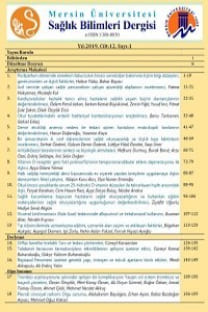Stres ve Demansta Hipotalamus-Hipofiz-Adrenal Ekseninin Rolü
Bir canlı, stres etmeni ile karşılaştığı zaman bir seri eşgüdümlü yanıtlar verir. Adrenal korteksten yüksek seviyede glukokortikoid salgılanmasına yol açan hipotalamus-hipofiz-adrenal ekseninin aktivite kazanması da bunların içindedir. Hipotalamus-hipofiz-adrenal ekseninin aktivitesi bir negatif geribildirim döngü ile düzenlenir. Bunu sağlayan, bu eksenin merkezi güdümünü denetleyen glukokortikoidlerdir. Kronik stres koşullarında tersine, glukokortikoidler hipotalamustaki paraventriküler nükleusdan kortikotropin salgılatıcı faktör ekspresyonundaki artışı baskılayamazlar ve kortizol buna bağlı olarak yükselir. Stresle değişen hipotalamus-hipofiz-adrenal eksen aktivitesinde, gonad hormonları glukokortikoidlere karşı duyarlığı artırarak kortizol yükselmesini önlemektedirler. Ancak kortizol seviyesi; yaşlı bireylerde, demanstaki hastalarda ve alzheimer hastalarında, oldukça yüksektir. Yüksek kortizol, öğrenme ve uzun süreli belleği engellemektedir.
Anahtar Kelimeler:
hipotalamus-hipofiz-adrenal ekseni, stres, demans
Stres ve Demansta Hipotalamus-Hipofiz-Adrenal Ekseninin Rolü
AbstractThe Role of the Hypothalamic-Pituitary-Adrenal Axis on Stres and Demantia An organism responds to a stressor with activation of the hypothalamo-pituitary-adrenal axis, culminating in the secretion of glucocorticoids from the adrenal cortex. Activity of the hypothalamo-pituitary-adrenal axis is regulated by a negative feedback loop that dampens central drive of the axis via the actions of the secreted glucocorticoids. Conversely, under conditions of chronic stress, glucocorticoids delivered centrally increase hypothalamic paraventricular nucleus corticotrophin releasing factor expression and cortisol level increases based on this. Gonad hormones in the stress induced hypothalamo-pituitary-adrenal axis activity, inhibits the rising of cortisol levels by increasing the sensitivity against glucocorticoids. However, clinically healthy elderly subjects and demented patients, particularly those with Alzheimer disease, had significantly higher cortisol levels.
Keywords:
hypothalamo-pituitary-adrenal axis, stress, demantia,
___
- McEwen BS. The neurobiology of stress. From serendipity to clinical relevence. Brain Res 2000;886:171—89.
- Tamer Ş. Stres Fizyolojisi. Yiğit R. Genel Fizyoloji, lÜ, İstanbul Tıp Fakültesi., Temel ve Klinik Bilimler Ders Kitapları, Nobel Tıp Kitabevi 2001 ;29-39.
- Magri F, Cravello L, Barili L, Sarra S, Cinchetti W, Salmoiraghi F, Micale G, Ferrati E. Stress and demantia: the role of the hypothalamic-pituitary—adrenal axis. Aging Clin Exp Res 2006;18:167—70.
- Herman JP, Ostrander MM, Muelle NK, Figueiredo H. Limbic system mechanisms of stress regulation: Hypothalamo—pituitary—adrenocoıticol axis. Prog Neuropsychopharmacol Biol Psychiatry 2005;29:1201-13.
- Wame JP. Shaping the stress response: Interplay of palatable food choices, glucocorticoids. insulin and abdominal obesity. Mol Cell Endocrinol 2008 (Başımda).
- Jacobson L, Sapolsky R. The role of the hippocampus in feedback regulation of the hypotalamic—pituitary— adrenocortical axis. Endocr Rev 1991 ; 12: 1 1 8—34.
- Diamond DM, Fleshner F, Ingersoll N, Rose GM. Psychological stress impairs spatial working memory. Ferrini M, Piroli G, Frontera M,Falbo A, Lima A, De Nicola AF. Estrogens normalize the hypotalamic—pituitary- Bamberger CM, Schulte HM, Chrousos GP. Molecular determinants of glucocorticoid receptor function and tissue Chirist—Crain M, Kola B, Lolly F, Fekete C, Sedoek D, Wittmann G,Feltrin D, lgreja AC, Ajodha S, Harwey White Schwartz MW Woods SC, Seeley RJ, Barsh GS, Baskin DG, Liebel LI. ls the energy homeostasis system inherently biased toward weight gain? Diabetes 2003;52:232—8.
- Fries E, Dettenborn L, Kirschbaum C. The cortisol awakening response (CAR): facts and future directions. Int J Psychophysiol 2008 (basımda).
- Stres ve Demansm HPA Detterborn L, Rosenloecher, F, Kirschbaum C. No effects of repeated forced wakings during three consecutive nights Buchanan TW, Kern S, Allen JS, Tranel D, Kirschbaum C. Circadian regulation of cortisol after hippocampal damage Hucklebridge F, Hussain T, Evans P, Clow A. The diurnal pattern of the adrenal steroids cortisol and Kim JJ, Diamond DM. The stressed hippocampus, synaptic plasticity and loss memories. Nat Rev Neurosc 2002;32453
- Selye H. The general adaptation syndrome and the diseases of adaptation. J Clin Med 1946;6.117—230.
- Lupien SJ, McEwen BS. The acute effects corticosteroids on cognition: integration of animal and human model Schaaf MJ, de Jong J, de Kloet ER, Vreugdenhil E. Down regulation of BDNF mRNA and protein in the rat Majer J. Biochemical effects of corticosteroids on neural tissues. Physiol Rev 1985;65:946—1020.
- Orchinik M, McEwens BS. Rapid steroid actions in the brain: a critique of genomic and non genomic mechanism. Sapolsky RM. Glucocorticoids, stres and their adverse neurological effects: relevance to aging. Exp Gerontol Sopolski RM, Krey LC, McEwens BS. Prolonged glucocorticoid exposure reduces hyppocampal neuron Belanger A, Roberts E,Bologa L, Flood JF, Smith GE A ve arkadaşları. Changes in serum cocentrations of conjugated and unconjugated in 40 to 80 year old men. J Clin Endocrinol Metab 1994;79:1086- 90.
- Roberts E, Bologa L, Flood JF, Smith GE. Effect of dehydroepiandrosterone and its sulphate on brain tissue in Adams RD, Victor M, Ropper AH. Norolojinin Prensipleri. Altıncı basım. Nobel Tıp Kitabevi 2003:181-90.
- Yayın Aralığı: Yılda 3 Sayı
- Başlangıç: 2008
- Yayıncı: Mersin Üniversitesi Sağlık Bilimleri Enstitüsü
Sayıdaki Diğer Makaleler
Nikotin ve Antagonisti Mecamylaminin Kurbağa (Rana ridibunda) İskelet Kası Üzerine Etkileri
Dilek KUMARGAL, Ülkü ÇÖMELEKOĞLU, Ali AŞKIN
Stres ve Demansta Hipotalamus-Hipofiz-Adrenal Ekseninin Rolü
Seyhan Şahan FIRAT, Necmiye CANACANKATAN, Belma KORKMAZ, Hatice YILDIRIM, Lülüfer TAMER, A Nihal SARI, Bahar TUNÇTAN
Mehmet BERKÖZ, Serap YALIN, Ülkü ÇÖMELEKOĞLU, Özgün SAĞIR, Pelin EROĞLU, Fatma SÖĞÜT
